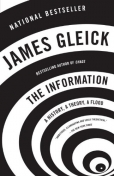BKMT READING GUIDES
The Information: A History, A Theory, A Flood (Vintage)
by James Gleick
Paperback : 544 pages
0 club reading this now
0 members have read this book
A New York Times Notable Book
A Los Angeles Times and Cleveland Plain Dealer Best Book of the Year
From the bestselling author of the acclaimed Chaos and Genius comes a thoughtful and provocative exploration of the big ideas of the modern era: Information, communication, and information ...
Introduction
A New York Times Notable Book
A Los Angeles Times and Cleveland Plain Dealer Best Book of the Year
From the bestselling author of the acclaimed Chaos and Genius comes a thoughtful and provocative exploration of the big ideas of the modern era: Information, communication, and information theory.
Acclaimed science writer James Gleick presents an eye-opening vision of how our relationship to information has transformed the very nature of human consciousness. A fascinating intellectual journey through the history of communication and information, from the language of Africa's talking drums to the invention of written alphabets; from the electronic transmission of code to the origins of information theory, into the new information age and the current deluge of news, tweets, images, and blogs. Along the way, Gleick profiles key innovators, including Charles Babbage, Ada Lovelace, Samuel Morse, and Claude Shannon, and reveals how our understanding of information is transforming not only how we look at the world, but how we live.
Amazon Best Books of the Month, March 2011: In a sense, The Information is a book about everything, from words themselves to talking drums, writing and lexicography, early attempts at an analytical engine, the telegraph and telephone, ENIAC, and the ubiquitous computers that followed. But that's just the "History." The "Theory" focuses on such 20th-century notables as Claude Shannon, Norbert Wiener, Alan Turing, and others who worked on coding, decoding, and re-coding both the meaning and the myriad messages transmitted via the media of their times. In the "Flood," Gleick explains genetics as biology's mechanism for informational exchange--Is a chicken just an egg's way of making another egg?--and discusses self-replicating memes (ideas as different as earworms and racism) as information's own evolving meta-life forms. Along the way, readers learn about music and quantum mechanics, why forgetting takes work, the meaning of an "interesting number," and why "[t]he bit is the ultimate unsplittable particle." What results is a visceral sense of information's contemporary precedence as a way of understanding the world, a physical/symbolic palimpsest of self-propelled exchange, the universe itself as the ultimate analytical engine. If Borges's "Library of Babel" is literature's iconic cautionary tale about the extreme of informational overload, Gleick sees the opposite, the world as an endlessly unfolding opportunity in which "creatures of the information" may just recognize themselves. --Jason Kirk
Discussion Questions
No discussion questions at this time.Book Club Recommendations
Recommended to book clubs by 0 of 0 members.
Book Club HQ to over 90,000+ book clubs and ready to welcome yours.
Get free weekly updates on top club picks, book giveaways, author events and more








